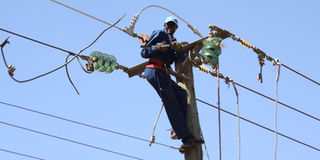Why electricity bills are still increasing

A technician fixes electricity lines in Nairobi. FILE PHOTO | NMG
What you need to know:
- Kenya has increased reliance on expensive diesel generators to shore up falling supply from hydro dams.
- The share of hydro power dropped to 27 per cent compared to 41 per cent in the 10 months to October 2016, with the dams’ production falling by 1.1 billion kWh.
- The fuel surcharge — which is linked to the amount of power produced by diesel generators and adjusted monthly in power bills — is currently at a three-year high of Sh4.35 per unit.
Kenya Power bought an additional one billion kilowatt hour (kWh) of expensive thermal electricity in the 10 months to October, leaving homes and businesses to struggle with costly bills.
The Kenya National Bureau of Statistics (KNBS) says that Kenya Power bought 2.1 billion kWh of electricity in the period to October, up from 1.1 billion in the same period a year.
Kenya has increased reliance on expensive diesel generators to shore up supply from several hydro dams that have dominated power generation for decades and whose production has been hindered by poor rains.
The share of hydro power dropped to 27 per cent compared to 41 per cent in the 10 months to October 2016, with the dams’ production falling by 1.1 billion kWh.
The fuel surcharge — which is linked to the amount of power produced by diesel generators and adjusted monthly in power bills — is currently at a three-year high of Sh4.35 per unit.
“We had poor hydrology in previous months that depressed hydropower generation and so thermal power had to come in to compensate for that,” ERC acting director-general Pavel Oimeke said earlier.
Diesel generation costs about Sh30 per kWh while the cost of geothermal power ranges between Sh7.12 and Sh8.01 per KWh and hydro at about Sh4, the government says.
Kenya in 2014 had a target to halve electricity bills by this year from levels of between Sh15-16 per KWh on the back of reduced thermal power.
Kenya has in recent years struggled to cut reliance on expensive thermal power in favour of cheaper geothermal and hydro power. The share of geothermal has remained little changed at about 47 per cent over the past two years, and poor rains have depleted water dams.
Official data shows that homes that consume 200 kWh a month paid Sh3,973 last month, up from Sh3,470 in November last year.
ALSO READ: Kenya’s Uganda power bill triples
Users of 50 units of power, mostly low-income earners, paid Sh649.75 last month, up from Sh533 in November last year, reflecting a 21.7 per cent increase.
Electricity prices have been rising from September and the December increase is expected to put pressure on inflation, which in November dropped to 4.73 per cent from 5.72 per cent the previous month, pushed down by a fall in the cost of some food items.




